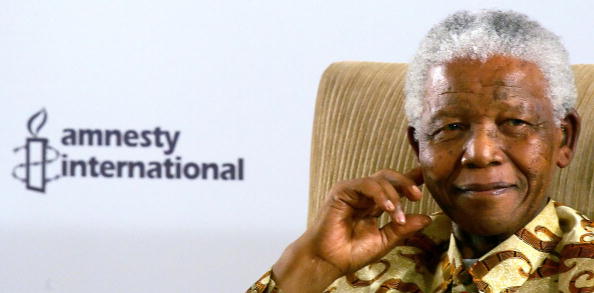
To the world, he is known as Nelson, an English name given to him by a teacher on his first day of school. To many South Africans, he is known by his Xhosa clan name: Madiba. And there is another name Nelson Mandela is known by, one that reflects the place he holds in the hearts of South Africans: “tata” or “father.”
Today, the former South African President and Nobel laureate Nelson Mandela, father of South African democracy and role model for human rights defenders everywhere, turns 95. It would be a notable milestone for anyone, but all the more incredible for Madiba because of the human rights issues he has helped advance during his lifetime.
Nelson Mandela’s activism dates back to his involvement in anti-colonial efforts in South Africa. He joined the African National Congress and helped found its Youth League. He helped stage the 1952 Defiance Campaign and organized the Congress of the People in 1955. As a practicing lawyer, he was repeatedly arrested for seditious activities as he sought to use the law to challenge apartheid policies, resulting in the Treason Trial in 1956 where he, along with other anti-apartheid leaders, were acquitted, and in the infamous Rivonia Trial in 1962 where Mandela along with Walter Sisulu, Govan Mbeki, Raymond Mhlaba, Andrew Mlangeni, Elias Motsoaledi, Ahmed Kathrada and others were sentenced to life imprisonment.
For the next 27 years, Mandela remained behind bars – first on Robben Island, and later in Pollsmoor and Victor Verster Prisons – breaking rocks and doing other forms of hard labor. On February 11, 1990, in the face of increasing violence in South Africa, growing pressure and isolation from the international community organized by a global anti-apartheid movement, President F. W. de Klerk released Mandela and other anti-apartheid leaders and unbanned all political parties.
Mandela worked with de Klerk to abolish apartheid and hold multiracial elections in 1994, which the African National Congress won. The elections also led to a Government of National Unity, which included de Klerk and was led by Mandela. The new government promulgated a new constitution, created the Truth and Reconciliation Commission to investigate past human rights abuses, and implemented policies to encourage land reform, combat poverty and expand healthcare services.
His life of political struggle and self-sacrifice became, and remains, an example to millions around the globe. His name is now synonymous with the struggle of people everywhere for freedom, equality and justice and will remain an inspiration and a reminder that we must remain ever vigilant and determined to confront injustice.
